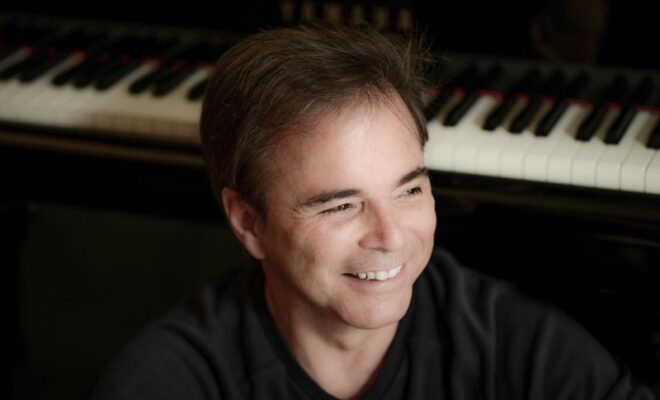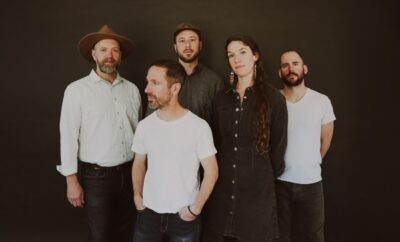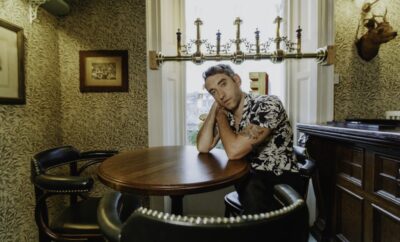 Courtesy of Jim Wilson
Courtesy of Jim Wilson
Interviews
Jim Wilson – Tuned In
By: Lisa Steinberg
Q) Who were some of your musical influences when you were growing up?
A) I am among the millions of people whose lives were changed on February 9, 1964. The Beatles exploded onto the American scene on “The Ed Sullivan show” and my life was forever changed. Swept up in the mania, I devoured their music and obsessed over their pictures. The Monkees and Herman’s Hermits were also idols. But my most lasting influence would have to be the folk songs my mom would listen to. I still hear echoes of those simple, pure melodies in my compositions today.
Q) Why was now the right time to share your new memoir Tuned In?
A) I’d been intending to write my memoir for years. Then, when the pandemic hit and I found all that time on my hands, I realized I was fresh out of excuses! I had no idea what an epic, four-year effort I was about to undertake, but I’m glad I did. It was a cathartic experience getting my story down for posterity and I think folks will enjoy the ride.
Q) You had a trouble(d) childhood back in West Texas. Were there stories you were nervous to share?
A) Some of the stories were hard to share (the story of unwittingly burning down my dad’s stables is still incredibly painful to face.) But I know that the memoirs that I connect with are the ones where the writer is vulnerable and takes a chance on revealing their humanity. As the saying goes, “you gotta leave blood on the page!”
Q) You initially moved to LA to pursue songwriting but wound up doing piano tuning that led to a lucrative piano technician career. Did your songwriting fall to the wayside while you stayed busy tuning pianos or were you always writing in the meantime?
A) Indeed, piano servicing was originally intended to be a means of supporting myself while trying to make it as a singer/songwriter in L.A. When my piano tech career succeeded beyond my wildest expectations (putting me in company with the likes of Paul McCartney, Elton John, Quincy Jones, et. al), I hit the snooze button on my musical aspirations. I was still trying to write hit songs, but my heart wasn’t really in it.
Q) The passing of your friend sort of changed your thoughts on success. How did that loss alter your path?
A) When my best friend Claude died of a heart attack at age thirty-seven, it shocked me into realizing that there isn’t a limitless reservoir of tomorrows. I saw how easily and instantly one’s dreams and aspirations can vanish into the ether. It also made me get real with myself and see that my original singer/songwriter dream no longer rang true.
In between my efforts to write the next hit song, I would compose pieces on piano just for my own gratification. When Claude died, I decided to polish these pieces and record an album of these piano-based instrumentals. If I were to get that tap on the shoulder like my friend Claude did, I wanted to have created something of lasting artistic value. As it happened, those pieces were a direct window into who I am as an artist. However, the idea of stepping out as a solo artist terrified me. I risked losing the respect I’d earned as a piano technician.
But Claude’s passing put things in perspective for me. Dying with an unfulfilled dream in my heart would have been a far worse fate than momentarily losing face.
Q) As someone who suffers from panic attacks themselves, what are some ways you learned to cope with this severe struggle?
A) My three big reminders before I go on stage or do an interview are: “Breathe… Focus… Unconditional Gratitude.”
Breathe: Taking long, slow, deep breaths help to ground you (and send a signal to the nervous system that all is well.)
Focus: I try to rally all my senses and laser focus on the present moment.
Unconditional Gratitude: Finally, I try to surrender fully — and with complete gratitude — into whatever is about to happen. Of course, I still get butterflies, I just try to get them to fly in formation!
Q) For someone who helped develop the first MIDI-adapter for acoustic piano, you were able to become quite close with the individuals who were childhood heroes to you. Were you hesitant or happy to share some of these tales in your book?
A) Sharing those tales was the initial impetus for writing the book. I knew that I’d had some extraordinarily rare experiences — singing Beatle songs with Paul McCartney, limo rides with Elton John, road trips with Carole King, horseback riding with Dan Fogelberg — and that folks enjoyed hearing those tales. But as my memoir evolved, it became about the bigger picture of how those experiences shaped me as an artist. The privilege of my front-row seat, witnessing the creative processes of all those artists was incredibly inspiring. The book ultimately became about the process of tuning in to the artist within.
Q) What advice would you offer those seeking to enter the music business these days?
A) Well, it’s certainly a different landscape today than it was a couple of decades ago. Spotify (and the minuscule royalties that streaming services pay) is less than wonderful news for folks starting out now. But in other ways, it’s a more democratic scene. You can create your music and launch it yourself — a direct connection to your fans.
But far senior to any of that is being true to yourself as an artist. Don’t chase trends. If you write music that inspires you, chances are it will inspire others as well.
Q) What do you hope lingers with audiences that explore your book Tuned In?
A) I think folks will get smiles out of these stories. But more importantly, I hope my journey of finding myself as an artist and succeeding in my mission to create music that is of value to people will inspire anyone pursuing a dream against the odds.
Q) With the book out now, have you begun working on any new music as well?
A) No new music in the works — yet. Bringing this book to life has been an all-consuming 4-year process, so I’m looking forward to finally coming up for air. However, I will be narrating an audiobook version of Tuned In soon!
Q) What would you like to say to everyone who are fans and supporters of the beautiful music you make?
A) I’d say thank you — from the bottom of my heart. My truest purpose in life is creating music that speaks to people’s innermost spiritual beauty. If my music adds value to even one person’s life, I’ve succeeded.





You must be logged in to post a comment Login